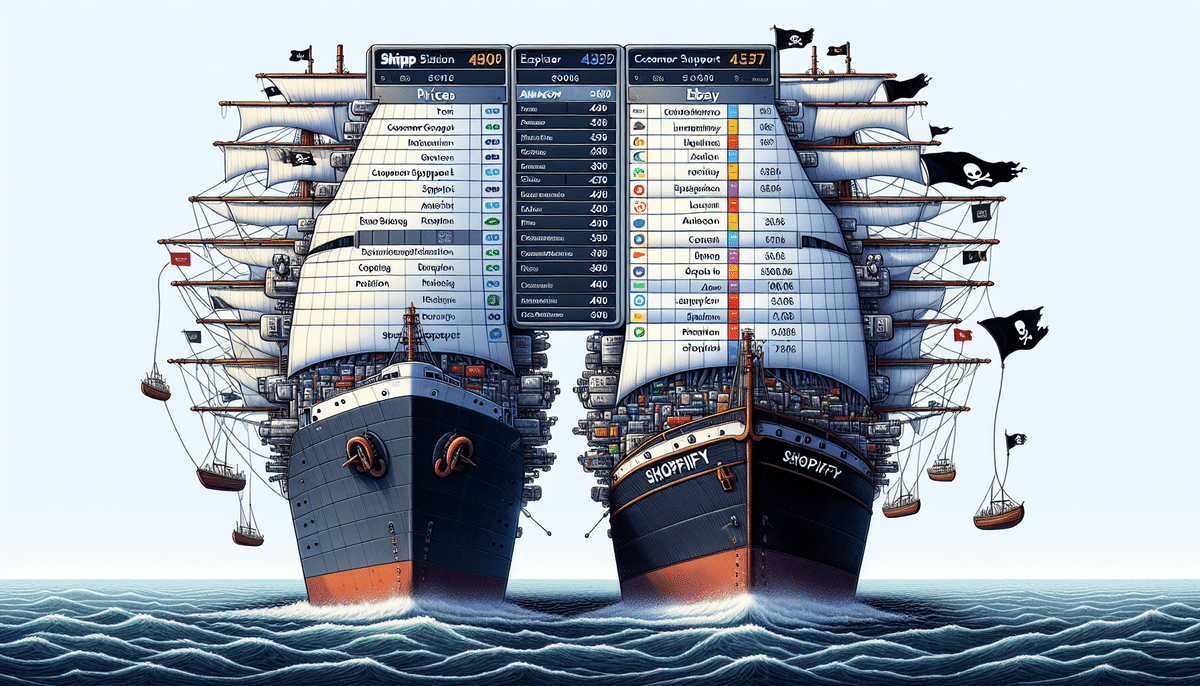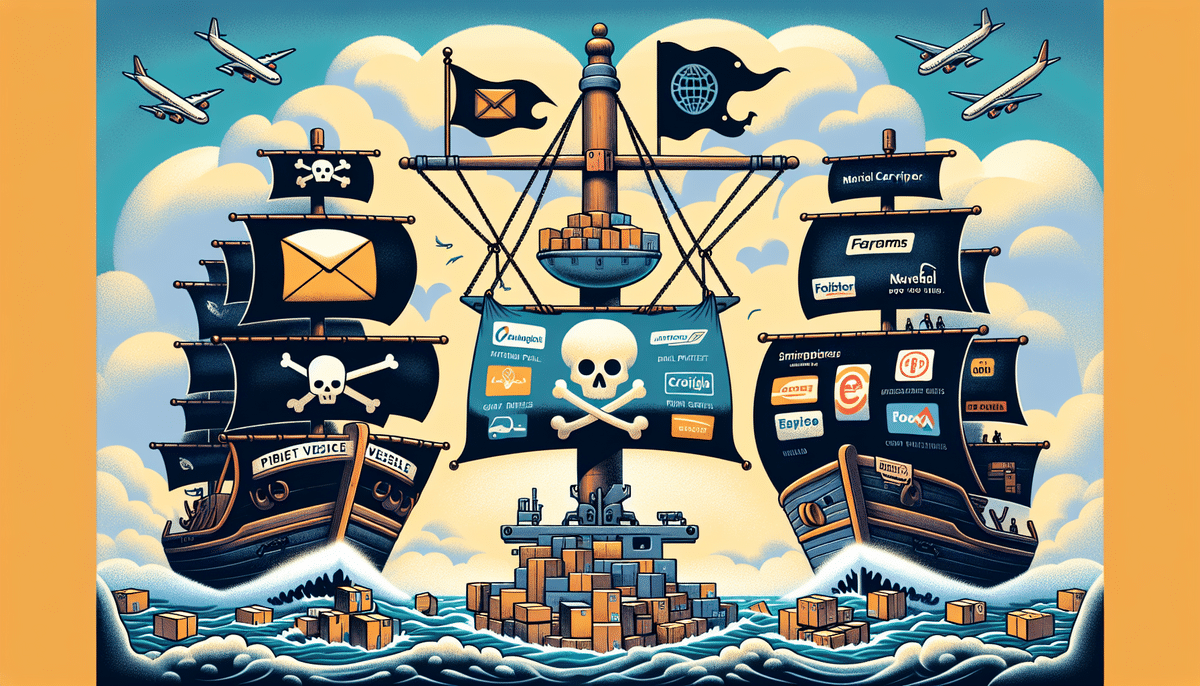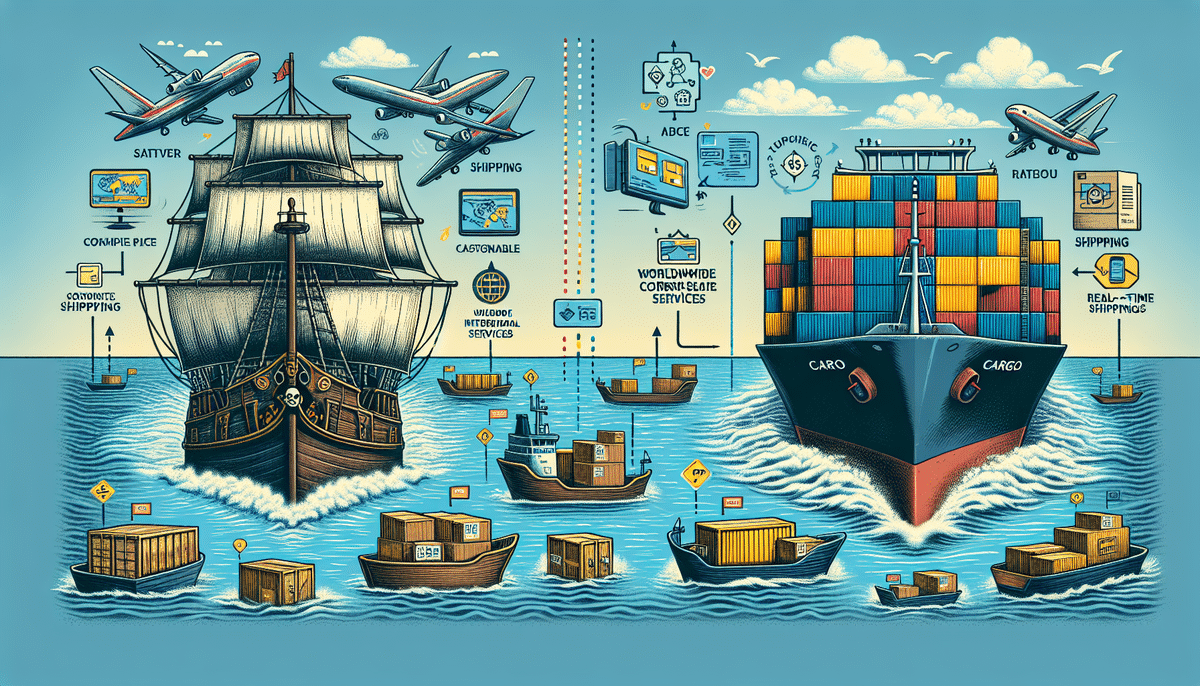ShipStation vs Pirate Ship: Choosing the Right Shipping Software for Your E-commerce Business
In the ever-evolving world of e-commerce, efficient shipping and logistics are paramount to business success. Selecting the right shipping software can significantly impact your operations, customer satisfaction, and overall profitability. ShipStation and Pirate Ship are two leading options available today. This article provides an in-depth comparison of these platforms, examining their features, user interfaces, customer service, app integrations, pricing, and more to help you determine which solution aligns best with your business needs.
Understanding ShipStation and Pirate Ship
ShipStation is a comprehensive cloud-based shipping platform designed to streamline order management, shipping, and fulfillment processes for e-commerce businesses of all sizes. It supports integration with numerous marketplaces and carriers, providing a centralized hub for managing shipments efficiently.
Pirate Ship, on the other hand, is a web-based shipping solution primarily focused on offering discounted USPS shipping rates. It's known for its simplicity and cost-effectiveness, making it a popular choice among small businesses and startups looking to minimize shipping expenses.
Both platforms offer integrations with major e-commerce platforms like Shopify, WooCommerce, and Amazon, enabling seamless synchronization of orders and shipping information. Advanced features such as batch shipping, automated rules, and customizable packing slips are available on both platforms, enhancing operational efficiency.
Key Features of ShipStation
ShipStation is packed with a variety of features tailored to meet the needs of growing e-commerce businesses:
- Order Management: Centralizes orders from multiple sales channels for easy tracking and processing.
- Multi-Carrier Shipping: Supports over 150 carriers, including DHL, FedEx, UPS, and USPS, allowing businesses to choose the best shipping rates and services.
- Branded Shipping Labels and Packing Slips: Customizes shipping documents to enhance brand visibility.
- Automatic Tracking Updates: Provides customers with real-time tracking information, improving transparency and trust.
- Batch Processing: Enables the handling of large volumes of orders simultaneously, saving time and reducing errors.
- Integrations: Connects with over 40 selling channels, including Shopify, Amazon, eBay, and Walmart.
- Custom Automation Rules: Automates repetitive tasks, such as assigning shipping methods based on order criteria.
- Reporting and Analytics: Offers detailed insights into shipping performance, helping businesses optimize their logistics strategies.
A standout feature of ShipStation is its support for international shipping. With capabilities to generate customs forms and commercial invoices, businesses can effortlessly expand their reach to global markets. Additionally, ShipStation's partnerships with major carriers provide discounted shipping rates, contributing to cost savings.
Key Features of Pirate Ship
Pirate Ship offers a streamlined set of features focused on providing affordable and efficient shipping solutions:
- USPS Shipping Options: Includes services like USPS Priority Mail, First Class Mail, and Global Express Guaranteed.
- Batch Shipping: Allows businesses to process multiple shipments at once, enhancing productivity.
- Address Verification: Ensures accurate shipping addresses to minimize delivery issues.
- Delivery Confirmation: Provides proof of delivery, enhancing customer satisfaction.
- Built-in Address Book: Stores frequent shipping addresses for quick access.
- Integrations: Connects with major e-commerce platforms such as Shopify, Etsy, and WooCommerce.
Pirate Ship is particularly renowned for its discounted USPS shipping rates, which can save businesses up to 90% compared to standard rates. This makes it an attractive option for small businesses that ship regularly but wish to keep costs low.
Additionally, Pirate Ship boasts a user-friendly interface that simplifies shipping management, making it accessible even to those with limited technical expertise. This ease of use allows businesses to focus more on growth and less on logistics.
Shipping Rates Comparison: ShipStation vs Pirate Ship
Pricing is a critical factor when selecting shipping software. While both ShipStation and Pirate Ship offer competitive rates, their pricing structures differ:
- ShipStation: Offers tiered pricing plans starting at $9 per month for businesses shipping fewer than 50 orders. Higher-tier plans provide access to more features and higher order limits, scaling with business growth.
- Pirate Ship: Provides free access to all of its features, charging only for the shipping labels purchased. This "pay-as-you-go" model is ideal for businesses with fluctuating shipping volumes or those looking to minimize upfront costs.
According to a Business News Daily report, Pirate Ship's ability to offer free software with low shipping costs can lead to substantial savings, especially for small to medium-sized businesses. ShipStation, while incurring monthly fees, compensates with a robust set of features that cater to more complex shipping needs.
In terms of ease of use, ShipStation's feature-rich platform may have a steeper learning curve compared to Pirate Ship's more straightforward interface. However, ShipStation's extensive integrations and automation capabilities can significantly enhance operational efficiency for larger businesses.
User Interface Comparison: ShipStation vs Pirate Ship
Both ShipStation and Pirate Ship prioritize user-friendly interfaces, but they cater to different user preferences:
- ShipStation: Features a comprehensive dashboard that allows users to manage orders, shipments, and inventory seamlessly. The interface supports extensive customization, enabling users to tailor the platform to their specific workflows.
- Pirate Ship: Offers a minimalist and intuitive interface focused on simplicity and ease of navigation. This design makes it easy for users to process shipments without being overwhelmed by unnecessary features.
ShipStation’s high level of customization is advantageous for businesses with complex shipping requirements, while Pirate Ship’s streamlined design benefits those who prefer a more straightforward approach.
Customer Service Comparison: ShipStation vs Pirate Ship
Customer support can significantly influence the overall user experience with shipping software:
- ShipStation: Provides customer support via phone, email, and live chat during business hours. They also offer a comprehensive knowledge base and community forums for self-help.
- Pirate Ship: Features a robust help center with FAQs, guides, and video tutorials. Users can submit support tickets or send emails for personalized assistance.
ShipStation is known for its responsive and knowledgeable support team, which can quickly resolve technical issues and provide guidance on using advanced features. However, support is limited to business hours, which might not be ideal for businesses operating across different time zones.
Conversely, Pirate Ship's help center is accessible 24/7, allowing businesses to seek assistance at any time. While direct support options are more limited, the extensive self-help resources cater to users who prefer finding solutions independently.
App Integration Comparison: ShipStation vs Pirate Ship
Integration capabilities are crucial for ensuring seamless workflows between your shipping software and other business tools:
- ShipStation: Supports integration with over 40 selling channels and third-party applications, including marketplaces, shopping carts, and accounting software. This extensive integration suite allows for centralized management of orders and shipments.
- Pirate Ship: Integrates with major e-commerce platforms such as Shopify, Etsy, and WooCommerce. While it offers fewer integrations compared to ShipStation, Pirate Ship provides features like "Simple Exporting" for easy order exports.
ShipStation's broad range of integrations makes it a versatile choice for businesses operating on multiple platforms and requiring sophisticated automation. Pirate Ship, although more limited in integrations, simplifies the shipping process for businesses with fewer sales channels.
Who Should Use ShipStation?
ShipStation is ideal for businesses that:
- Handle high volumes of orders across multiple sales channels.
- Require advanced automation tools and detailed reporting.
- Need comprehensive international shipping support.
- Seek extensive integrations with various e-commerce and business platforms.
According to a Forbes article, ShipStation is particularly beneficial for mid-to-large-sized businesses looking to scale their operations efficiently.
Who Should Use Pirate Ship?
Pirate Ship is perfect for businesses that:
- Are small to medium-sized with limited shipping volumes.
- Primarily ship through USPS and seek the lowest possible rates.
- Prefer a cost-effective, pay-as-you-go pricing model.
- Value simplicity and ease of use over extensive features.
Pros and Cons of Using ShipStation
- Pros:
- Extensive integrations with over 40 platforms
- Wide selection of carriers and shipping options
- Robust automation and customization tools
- Detailed reporting and analytics
- Supports international shipping
- Cons:
- Higher pricing plans may not be suitable for all budgets
- Steeper learning curve due to extensive features
- Potential overkill for businesses with simple shipping needs
Pros and Cons of Using Pirate Ship
- Pros:
- Competitive, pay-as-you-go pricing with no monthly fees
- Easy-to-use and intuitive interface
- Significant shipping rate discounts through USPS partnerships
- Free access to all features
- Cons:
- Limited integrations compared to ShipStation
- No inventory management features
- Support options are less comprehensive
- Primarily geared towards USPS, with fewer carrier options
Pricing Comparison: ShipStation vs Pirate Ship
When evaluating affordability, Pirate Ship typically offers more cost-effective solutions, especially for businesses with lower shipping volumes. Its free software model combined with discounted USPS rates can result in significant savings. According to Business.com, Pirate Ship's pricing structure appeals to startups and small businesses aiming to reduce shipping costs without incurring monthly fees.
ShipStation, while more expensive with plans starting at $9 per month, provides a comprehensive suite of features that justify the cost for businesses with higher shipping demands and the need for advanced automation and integrations. A TechRadar review highlights that ShipStation's pricing aligns with its robust feature set, making it a worthwhile investment for scaling businesses.
Ease of Use Comparison: ShipStation vs Pirate Ship
Both platforms prioritize user experience, but their approaches differ:
- ShipStation: Offers a feature-rich interface that requires a bit more time to master. Its comprehensive tools and customization options can be initially overwhelming for new users but provide powerful functionality once learned.
- Pirate Ship: Boasts a straightforward and intuitive interface, making it easy for users to navigate and manage shipping tasks without a steep learning curve. This simplicity is ideal for businesses seeking a hassle-free shipping solution.
Ultimately, the choice between ShipStation and Pirate Ship in terms of ease of use depends on your business's specific needs and your team's familiarity with shipping software.
Advantages and Disadvantages of Choosing Either Platform
Choosing between ShipStation and Pirate Ship hinges on balancing your business's needs with each platform's offerings:
- ShipStation:
- Advantages: Comprehensive feature set, extensive integrations, international shipping support, and detailed analytics.
- Disadvantages: Higher cost, steeper learning curve, and potentially excessive features for simple shipping needs.
- Pirate Ship:
- Advantages: Cost-effective pricing, ease of use, significant USPS rate discounts, and free access to all features.
- Disadvantages: Limited integrations, lack of advanced shipping options, and minimal customer support channels.
Businesses should assess their shipping volumes, required features, budget constraints, and technical capabilities to determine which platform offers the best fit.
Final Verdict: Which Shipping Software is Right for Your Business?
Both ShipStation and Pirate Ship are powerful shipping solutions tailored to different business needs. If your business requires a robust, feature-rich platform with extensive integrations and international shipping capabilities, ShipStation is the superior choice despite its higher pricing. Conversely, if you're a small to medium-sized business seeking an affordable, easy-to-use solution with excellent USPS rate discounts, Pirate Ship is an excellent option.
Ultimately, the best choice depends on your specific business requirements, shipping volumes, and budget. Carefully evaluating the features, pricing, and support options of each platform will ensure that you select the shipping software that best aligns with your e-commerce goals.



















